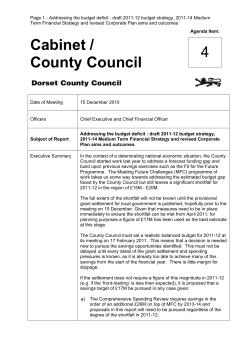
How to contact your FLO Ciorstaidh Hayward Trevarthen
Roman Samian bowl from Ilchester, Somerset How to contact your FLO What your FLO can do: • Identify and record your objects and provide you with a short report. • Advise about conservation and how to clean and store your finds. • P rovide advice and guidance on the Treasure Act and Code of Practice for Responsible Detecting. • P ut you in touch with your local heritage services such as the Historic Environment Record to find out more about your area. • Provide guidance on how to use Ordnance Survey maps or http://magic.defra.gov.uk for identifying find spots. Ciorstaidh Hayward Trevarthen Finds Liaison Officer (Dorset) Historic Environment, Environmental Services Directorate, Dorset County Council, County Hall, Colliton Park, Dorchester, Dorset DT1 1XJ Direct Line: 01305 228254 E-mail: c.h.trevarthen@dorsetcc.gov.uk Laura Burnett Finds Liaison Officer (Somerset) Somerset Heritage Centre, Brunel Way, Norton Fitzwarren, Taunton, Somerset TA2 6SF Direct Line: 01823 347457 E-mail: LBurnett@somerset.gov.uk www.finds.org.uk Recording archaeological finds in Somerset and Dorset Roman denarius from Bradford Peverell, Dorset 16th century pin from Lopen, Somerset, acquired by the Museum of Somerset Neolithic arrowhead from Bishops Lydeard, Somerset Medieval penny from Piddletrenthide, Dorset Middle Bronze Age axe from Wiveliscombe, Somerset Medieval seal matrix from Tarrant Monkton, Dorset The Portable Antiquities Scheme… Which finds should be reported? How long will this take? Your FLO is interested in all archaeological objects that you have found but will usually record only those dating to before about 1700 AD. This includes not just metal but also pottery, flint, stone and anything else you might find. It may be possible to record your finds there and then but usually the FLO prefers to borrow your finds for a short time, usually no more than two months, so they can be researched, photographed and recorded properly. You will be issued with a receipt while they are in the FLO’s care. … is a national scheme to encourage the voluntary recording of archaeological objects found by members of the public and in particular metal detector users. • A digital image The scheme has established a network of Finds Liaison Officers (FLOs) across the country. They can provide advice and record your finds on a national database for everyone to use: www.finds.org.uk. This information is entered into the database at www.finds.org.uk which already holds details of over three quarters of a million objects from across England and Wales. In Dorset the FLO is based with Dorset County Council in Dorchester. In Somerset they are in the Somerset Heritage Centre in Taunton. Help us to learn more about our heritage by reporting your finds Your FLO may ask to borrow your artefacts for recording. They will be returned to you afterwards! What information will be recorded? • An identification and description of the object • Where and how it was found (precise find spot information is not made public but is needed by specialist researchers). How to report your finds You can bring your finds to your FLO at their office but please contact us beforehand to make an appointment. Regular drop-in surgeries are held around the counties which may be more convenient for you. Contact your FLO or see the website for upcoming events. The Treasure Act Under the Treasure Act 1996 you have a legal requirement to report any treasure finds to the coroner within 14 days. Your FLO can help identify what is treasure and can report the find to the coroner for you. Please note the information given to us is subject to the Freedom of Information Act (2000) and the Data Protection Act (1998)
© Copyright 2025





















